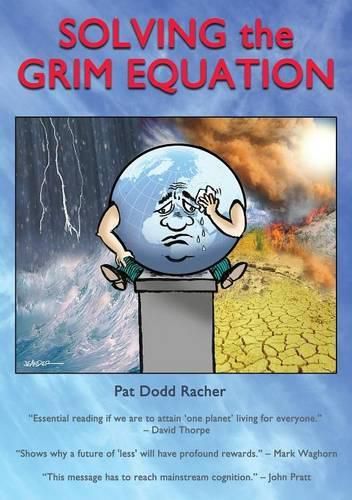Readings Newsletter
Become a Readings Member to make your shopping experience even easier.
Sign in or sign up for free!
You’re not far away from qualifying for FREE standard shipping within Australia
You’ve qualified for FREE standard shipping within Australia
The cart is loading…






This title is printed to order. This book may have been self-published. If so, we cannot guarantee the quality of the content. In the main most books will have gone through the editing process however some may not. We therefore suggest that you be aware of this before ordering this book. If in doubt check either the author or publisher’s details as we are unable to accept any returns unless they are faulty. Please contact us if you have any questions.
Solving the Grim Equation considers how globalisation increases corporate power and marginalises communities, how fossil fuel use accelerates climate change, and why material standards of living will have to decline in all countries where populations use more than their fair share of natural resources. Solving the Grim Equation continues the story begun in Empty Plates Tomorrow? which was published in 2007. The more we consume now, the less will be available to future generations, because continuous population growth and economic expansion on a finite planet are impossible. The dangerous consequences of the Fossil Fuel Age are apparent all over the planet and in the atmosphere above it. The future of ‘less’ will be different but need not be the appalling dystopia which some predict. There are hopeful, if small, initiatives all around the world, and examples from Wales feature in this book. The debt-laden global financial system is a colossal barrier because repayments of debt interest and capital require economic growth. The alternative is a depression in which populations are impoverished, unless governments agree debt cancellations with each other and plan for progressive reductions in energy use. Governments with the welfare of their populations at heart will also have to control the global banking industry, which contributes in no small way to the staggering wealth inequalities on this small planet.
$9.00 standard shipping within Australia
FREE standard shipping within Australia for orders over $100.00
Express & International shipping calculated at checkout
This title is printed to order. This book may have been self-published. If so, we cannot guarantee the quality of the content. In the main most books will have gone through the editing process however some may not. We therefore suggest that you be aware of this before ordering this book. If in doubt check either the author or publisher’s details as we are unable to accept any returns unless they are faulty. Please contact us if you have any questions.
Solving the Grim Equation considers how globalisation increases corporate power and marginalises communities, how fossil fuel use accelerates climate change, and why material standards of living will have to decline in all countries where populations use more than their fair share of natural resources. Solving the Grim Equation continues the story begun in Empty Plates Tomorrow? which was published in 2007. The more we consume now, the less will be available to future generations, because continuous population growth and economic expansion on a finite planet are impossible. The dangerous consequences of the Fossil Fuel Age are apparent all over the planet and in the atmosphere above it. The future of ‘less’ will be different but need not be the appalling dystopia which some predict. There are hopeful, if small, initiatives all around the world, and examples from Wales feature in this book. The debt-laden global financial system is a colossal barrier because repayments of debt interest and capital require economic growth. The alternative is a depression in which populations are impoverished, unless governments agree debt cancellations with each other and plan for progressive reductions in energy use. Governments with the welfare of their populations at heart will also have to control the global banking industry, which contributes in no small way to the staggering wealth inequalities on this small planet.